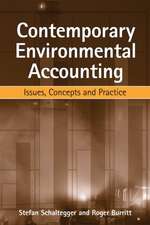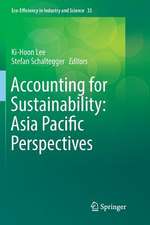Corporate Carbon and Climate Accounting
Editat de Stefan Schaltegger, Dimitar Zvezdov, Igor Alvarez Etxeberria, Maria Csutora, Edeltraud Güntheren Limba Engleză Paperback – 30 mar 2018
This volume is devoted to management accounting approaches for analyzing business benefits and costs of climate change. It discusses future directions on carbon accounting, performance measurement and reporting as well as links between climate accounting and business processes, product and service development, supply chain innovation, economic successes and stakeholder relations.
Companies are increasingly called on to contribute to combatting climate change and also face the challenges presented by climate-change related costs, risks and benefits. Risks can result from unpredictable weather conditions and government regulations, such as the EU emission trading system and new building codes. Climate change also offers numerous opportunities, such as energy efficiency innovations and carbon neutral products and production.
Good management requires that carbon emissions are tracked and climate-related costs, risks and benefits are identified, measured and assessed. As such, research addressing corporate accounting frameworks and tools is of increasing importance when it comes to managing these carbon and climate-related issues.
| Toate formatele și edițiile | Preț | Express |
|---|---|---|
| Paperback (1) | 639.25 lei 6-8 săpt. | |
| Springer International Publishing – 30 mar 2018 | 639.25 lei 6-8 săpt. | |
| Hardback (1) | 645.47 lei 6-8 săpt. | |
| Springer International Publishing – 8 feb 2016 | 645.47 lei 6-8 săpt. |
Preț: 639.25 lei
Preț vechi: 752.06 lei
-15% Nou
Puncte Express: 959
Preț estimativ în valută:
122.32€ • 128.05$ • 101.21£
122.32€ • 128.05$ • 101.21£
Carte tipărită la comandă
Livrare economică 05-19 aprilie
Preluare comenzi: 021 569.72.76
Specificații
ISBN-13: 9783319802008
ISBN-10: 3319802003
Ilustrații: XII, 257 p. 21 illus., 8 illus. in color.
Dimensiuni: 155 x 235 mm
Greutate: 0.39 kg
Ediția:Softcover reprint of the original 1st ed. 2015
Editura: Springer International Publishing
Colecția Springer
Locul publicării:Cham, Switzerland
ISBN-10: 3319802003
Ilustrații: XII, 257 p. 21 illus., 8 illus. in color.
Dimensiuni: 155 x 235 mm
Greutate: 0.39 kg
Ediția:Softcover reprint of the original 1st ed. 2015
Editura: Springer International Publishing
Colecția Springer
Locul publicării:Cham, Switzerland
Cuprins
Introduction.- Decision Support through Carbon Management Accounting – A Framework-based Literature Review.- Corporate sustainability footprints – a review of current practices.- Carbon accounting: a review of the existing models, principles and practical applications.- The attributional-consequential distinction and its applicability to corporate carbon accounting.- Implementing an EMA innovation: the case of carbon accounting.- Carbon accounting in long supply chain industries.- Voluntary greenhouse gas reporting: A matter of timing?.- Carbon emissions and corporate financial performance: a systematic literature review and options for methodological enhancements.- Organizational Climate Accounting - Financial Consequences of Climate Change Impacts and Climate Change Adaptation.- Carbon emission accounting fraud.
Textul de pe ultima copertă
This volume is devoted to management accounting approaches for analyzing business benefits and costs of climate change. It discusses future directions on carbon accounting, performance measurement and reporting as well as links between climate accounting and business processes, product and service development, supply chain innovation, economic successes and stakeholder relations.
Companies are increasingly called on to contribute to combatting climate change and also face the challenges presented by climate-change related costs, risks and benefits. Risks can result from unpredictable weather conditions and government regulations, such as the EU emission trading system and new building codes. Climate change also offers numerous opportunities, such as energy efficiency innovations and carbon neutral products and production.
Good management requires that carbon emissions are tracked and climate-related costs, risks and benefits are identified, measured and assessed. As such, research addressing corporate accounting frameworks and tools is of increasing importance when it comes to managing these carbon and climate-related issues.
Caracteristici
Compiles state of the art corporate climate accounting research and Discusses and proposes frameworks, methods, case studies, practices and future developments. This includes carbon footprinting, assessment approaches, specific industry applications, etc Analysesof achievements, problems and possible solutions in carbon and climateaccounting Linksbetween macro (global, international, national or industry) carbon and climateaccounts and climate accounting on the organisational level Offers proposalsfor the future development of carbon climate accounting Includes supplementary material: sn.pub/extras





















